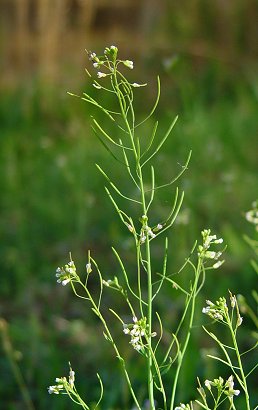Avi Blizovsky

A joint team of researchers from the Technion and the Hebrew University succeeded in developing, using genetic engineering methods, plants that are resistant to herbicides. The development was made possible by combining a new herbicide with a catalytic antibody that breaks it down, as the prestigious scientific journal Nature Biotechnology reveals this week.
In the first step, the researchers developed a new herbicide, which can be catalytically broken down by a specific catalytic antibody. They then cloned the gene for that antibody in a grass called Arabidopsis thaliana. Finally, the scientists showed that transgenic plants are completely resistant to the new herbicide.
"Preventing the growth of weeds is a difficult and expensive task," explained Professor Ehud Kinan from the Faculty of Chemistry at the Technion. "This is one of the main problems in modern agriculture, as weeds may harm not only cultivated plants, but also animals."
Professor Keenan carried out the research together with doctoral students Avidor Shulman and Ira Ben-Shir, and with professor Shmuel Wolf and doctoral student Yael Weiss from the Faculty of Agricultural, Food and Environmental Sciences at the Hebrew University, Rehovot. "Granting herbicide immunity to commercial plants is a very important goal. Our results may open the door to new methods of killing weeds, especially weeds that have a genetic affinity to the main crop," he says.
The traditional methods of developing varieties resistant to herbicides are based on plant breeding and hybridization between cultured plants and naturally resistant plants. Recently, the selection of cell cultures has also begun to be used, with the aim of creating resistant tumors. The researchers focused on herbicides from the carbamate family, which are currently in commercial use as germination inhibitors. They have designed and produced a new carbamate herbicide, which can be broken down very efficiently using a unique catalytic antibody. Each antibody molecule is a protein, which is produced in the mammalian immune system. Each such protein is encoded by a specific gene, which can be cloned into another organism. Expressions of catalytic antibodies in any organism, is an overall strategy for changing the entire organism - not just plants.
Professor Keenan adds that the study of catalytic antibodies is primarily a field of chemical research, which utilizes the vast variety of different antibody molecules in the immune system and their programming possibilities, which are currently available to laboratory researchers. The field of catalytic antibodies is located at the interface between the sciences of chemistry and immunology. During the last two decades, successes in the creation of monoclonal antibodies for more than 100 chemical reactions have already been recorded in this creative field. The growing list of beneficial applications includes selective organic synthesis, biosensing, mechanistic understanding of biocatalysis and its evolution, and medical applications, including cancer chemotherapy. The researchers' success in the development of plants resistant to herbicides, illustrates the possibilities that have not yet been explored - the in-body improvement of the organism's phenotype by using the gene that encodes the catalytic antibody into the genome of that organism. The central message is that a catalytic antibody, properly designed and manufactured, can solve any problem that can be defined in terms of a chemical reaction. This research direction offers attractive possibilities in biotechnology, the chemical industry, agriculture and medicine.
https://www.hayadan.org.il/BuildaGate4/general2/data_card.php?Cat=~~~495402134~~~27&SiteName=hayadan
